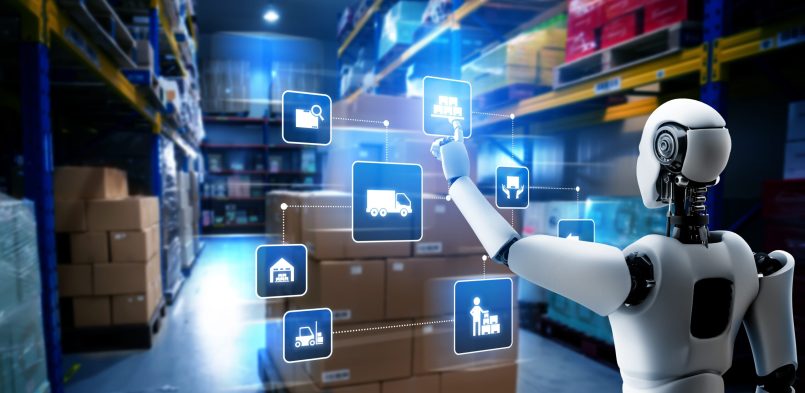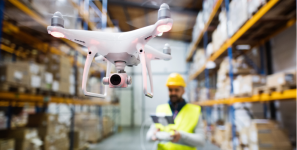AI in Warehouse Management Market: Enhancing Logistics with Predictive Intelligence
Introduction
Artificial Intelligence (AI) in warehouse management refers to the use of advanced algorithms and machine learning technologies to enhance the efficiency and effectiveness of warehouse operations. AI systems can automate tasks such as inventory management, picking processes, and logistics planning. They are designed to predict demand, optimize stock levels, and even guide autonomous robots to move goods within a facility, reducing errors and improving operational speed.
Read also: Optimizing Warehouse Automation: Understanding Key Considerations
According to Market.us, The Global AI in Warehouse Management Market is projected to experience significant growth, with the market size anticipated to expand from USD 2.6 Billion in 2023 to approximately USD Billion by 2033. This robust expansion reflects a compound annual growth rate (CAGR) of 39.0% during the forecast period from 2024 to 2033. This growth trajectory underscores the increasing integration of AI technologies in warehouse management, driven by the need for enhanced operational efficiency and data-driven decision-making in supply chain operations.
The AI in the warehouse management market is experiencing robust growth, driven by the need for enhanced operational efficiency, improved safety, and cost reductions. AI technologies are being integrated into warehouse operations to streamline processes such as inventory management, picking, packing, and equipment routing. By leveraging real-time data through digital twins, warehouse managers can make informed decisions that boost productivity and reduce downtime. Safety is another significant factor, with AI-powered monitoring systems providing real-time alerts to prevent accidents and ensure compliance with safety standards. Additionally, AI’s predictive analytics capabilities help prevent costly equipment failures by foreseeing maintenance needs.
Suggested Reading – “Warehouse Automation Market: Transforming Logistics with Cutting-Edge Robotics”
Opportunities abound in this evolving market, particularly with the integration of AI with IoT devices and robotics. Autonomous Mobile Robots (AMRs) and cloud-based AI solutions are transforming how warehouses operate, offering scalable, flexible, and cost-effective methods to enhance efficiency and reduce human labor. Moreover, the advanced data analytics provided by AI allows warehouses to gain valuable insights that optimize operations and improve customer satisfaction. As businesses continue to adopt these technologies, those that embrace AI in their warehouse management systems are likely to gain a significant competitive advantage.
AI In Warehouse Management Statistics
- The Global AI in Warehouse Management Market is projected to reach USD 70 Billion by 2033, growing from USD 2.6 Billion in 2023 at a CAGR of 39.0% during the forecast period from 2024 to 2033.
- In 2023, the Solution segment dominated the Component segment of the AI in Warehouse Management Market, capturing over 74.5% of the market share.
- The Inventory Management segment led the Application segment in 2023, holding a significant 32.1% share of the market.
- Within the End-Use Industry segment, Retail & E-commerce emerged as the leading sector in 2023, securing more than 34.0% of the market share.
- North America held the largest regional market share in 2023, commanding 38.8% of the market and generating USD 1.0 Billion in revenue for the AI in Warehouse Management Market.
Emerging Trends in AI in Warehouse Management
- Automation Integration: There’s a growing trend to retrofit traditional forklifts with automation technology for use during peak seasons, alongside autonomous robots like the Kiva systems used in Amazon’s warehouses for shelf moving.
- Advanced Robotics: Use of sophisticated robotic systems that perform tasks such as picking and sorting autonomously, enhancing efficiency and reducing the dependency on manual labor.
- Generative AI: This technology is being applied to create and optimize logistics data, contributing to improved warehouse layout and inventory management.
- AI in Predictive Maintenance: AI technologies are increasingly used for predictive maintenance, ensuring equipment reliability and reducing downtime.
- Drones and Cobots: There’s an increase in the adoption of drones for tasks like inventory scanning and cobots designed to work alongside humans, making operations more efficient.
Top Use Cases for AI in Warehouse Management
- Optimized Picking and Packing: AI enhances accuracy in the picking process, reducing errors and improving order fulfillment speed.
- Load Optimization: AI tools help in optimizing how goods are loaded into transportation vehicles, saving on shipping costs and improving delivery times.
- Automated Returns Processing: AI automates the categorization and processing of returns, significantly improving efficiency in handling returns.
- Real-time Demand Forecasting: AI algorithms provide precise demand forecasting, helping warehouses manage inventory more effectively.
- Cold Chain Monitoring: AI-enhanced sensors ensure the integrity of temperature-sensitive products throughout storage and transportation.
Major Challenges in AI Adoption in Warehouse Management
- Data Management: High-quality, consistent data is crucial for AI effectiveness, yet many warehouses struggle with data inconsistencies.
- Integration with Legacy Systems: Many warehouses still rely on older systems that may not integrate smoothly with new AI technologies.
- Cost of Implementation: The high initial cost of AI technology, including robotics and AI systems, can be a barrier for many operators.
- Technological Complexity: Managing the complexity of AI systems and training staff to use them effectively poses significant challenges.
- Regulatory and Ethical Issues: Navigating the regulatory landscape and ethical concerns related to data use and automation is complex and can impede AI adoption.
Top Opportunities in AI in Warehouse Management
- Increased Efficiency: AI-driven automation can significantly enhance operational efficiency, reducing labor costs and improving throughput.
- Enhanced Accuracy: AI technologies can minimize errors in inventory management, leading to better customer satisfaction.
- Scalability: AI solutions can scale with the business, supporting growth without the proportional increase in labor.
- Sustainability: AI can help in implementing more sustainable practices in warehousing, such as optimizing energy usage and reducing waste.
- Competitive Advantage: Early adopters of AI in warehouse management can gain significant competitive advantages, improving service quality and operational agility.
Conclusion
The integration of AI into warehouse management is transforming the industry by optimizing operations, enhancing efficiency, and reducing costs. Despite challenges such as high initial investments and integration complexities, the benefits of adopting AI technologies are profound. Warehouses that leverage AI for tasks like predictive maintenance, optimized picking, and real-time demand forecasting are positioned to meet modern logistics demands more effectively. As AI continues to evolve, it offers significant opportunities for warehouses to innovate and improve their operational capabilities, ultimately leading to better business outcomes and increased competitiveness in a rapidly changing market.
Source of information : https://market.us/report/ai-in-warehouse-management-market/





Leave a Reply